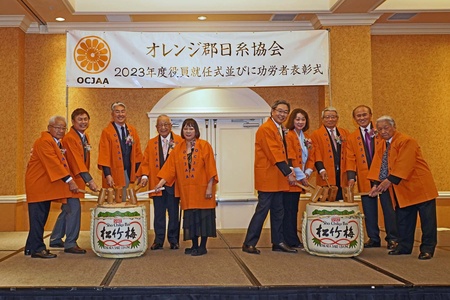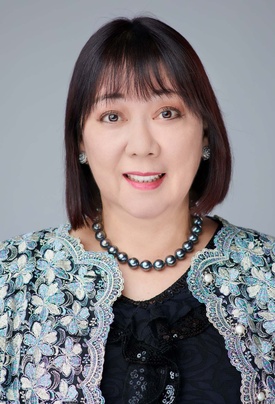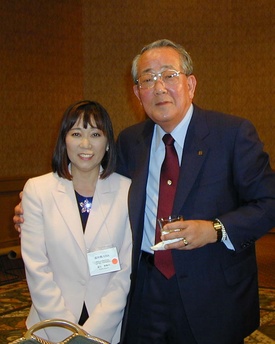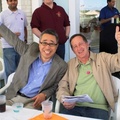"Maybe it's a good fit overseas."
Kimiko Fujita has two faces. She is the business owner who has run a music school in the United States for 35 years, and the other face is a community leader in the Japanese American community, involved in the activities of numerous organizations, including the Orange County Japanese American Association, where she volunteered for 30 years and served as president for 10 years until 2023. Fujita came to the United States in 1987. She went to New York to improve her English skills, but there she met and married a third-generation Japanese man. She never returned to Japan, but instead moved from New York to Los Angeles, where her husband was born, where she remains to this day.
"When I graduated from high school, there weren't many people who could play the electone. So I got qualified as an electone instructor and performer and started teaching at a school in Shinsaibashi, Osaka. After that, I was asked to play the electone on television programs, and I appeared and played on popular shows.
Furthermore, Yamaha wanted to spread the Electone classes overseas, so I was stationed in Australia for a year and taught instructor training classes. During that time, I felt a sense of openness that I had never experienced in Japan, and thought that maybe I was suited to living overseas. However, the pace of things in Australia was too slow, so I thought that it might not suit me. After that, I went to New York to improve my English skills, and the (fast-paced) tempo of New York was perfect for me, so I liked it.
"I didn't know anything about Japanese people."
Fujita recalls that at first she felt uncomfortable around the man who would become her husband, whom she met in New York and married.
"At the time, I had no idea about Japanese people who have Japanese faces but whose first language is English. He was born in Japan but grew up in America from the age of four, so he studied Japanese. And my husband apparently had the impression of me that 'Japanese people are supposed to be quiet, but they're not' (laughs)."
Although she kept her own music school in Osaka, Fujita, after getting married in 1988, handed the Osaka school over to her successor and moved from Manhattan to begin teaching from her home in the suburbs of New York.
"During the bubble economy, we had an increase in the number of Japanese students, so we removed the furniture in the dining room and switched to group lessons. But then the Yamaha Music Education department asked us to set up a classroom in a shopping center, so my husband requested a transfer to his hometown of Los Angeles. We took this opportunity to return here, taking over the classroom and teaching duties of the retiring owner, and started the Yamaha Music School in Torrance."
Fujita-san believed that Yamaha should provide lessons in English even though it is a Japanese company, so he promoted localization by teaching in both Japanese and English. After that, he expanded to Irvine, and then to Laguna Niguel, which closed due to the COVID-19 pandemic, and now has 40 to 50 instructors and staff, and has taught more than 30,000 students to date.
"When I first purchased the Irvine school, the rent was extremely high and almost equal to the income from lesson fees, meaning that when you take into account labor costs and other expenses, I was running at a loss. I realized that this couldn't continue, so I moved to a location with cheaper rent and was able to rebuild. But if you ask me if I had any difficulties running the school, I can only say that I was lucky.
In fact, even though I have been running a business in the United States for 35 years, I have never thought of the hardships as hardships. I am also grateful that I was able to learn about the altruistic spirit from the head of Seiwa Juku, whom I respect, the late Kazuo Inamori, which was a very valuable experience I attended 20 years ago."
"I'm Japanese-American"
Speaking of "altruism," in addition to running his music school, Fujita has donated his time and effort to many community activities.
"My involvement with the Orange County Japanese Society began when one of my students' parents asked if they could use the courtyard of the shopping center where my classroom is located as the venue for a Japan Fair that the society was hosting, so I negotiated with the landlord and received permission. I only thought I would just help out, but before I knew it, I became a board member of the society, and in 2013 I was nominated for chairman, a role I've been involved with for 10 years. I've also been involved with the Senior Foundation Charitable Corporation, a women's business owner's association, and became involved in Keiro activities after the Respect for the Aged facility was sold. Currently, I'm one of two Japanese board members, most of whom are Japanese-American.
The reason I participate in community activities like this is because I want to give something back to the community that has helped me so much. If I had stayed in Japan and never come to America, perhaps I would still only be thinking about my own students. But by coming to America, I have been able to provide music education to tens of thousands of international students. I am truly grateful that I was able to do this in America, coming from Japan."

In recognition of his numerous achievements, Fujita was awarded the Minister of Foreign Affairs Commendation for 2021 by the Japanese government.
Finally, I asked a question about his identity: "What nationality are you?" to which he replied, "I'd say I'm Japanese-American. I've lived exactly half in Japan and half in the United States. But I wouldn't say I'm an international person (laughs)."
Mr. Fujita, who calls himself Japanese-American, has reflected on his experience of not knowing anything about Japanese Americans before he moved to the U.S., and is still working on various projects, such as negotiating with the school principal to add the Japanese American National Museum in Los Angeles to the list of school trip destinations for high school students from Japan, and exploring plans to connect Japanese Americans and Japanese people. However, the thing that made the biggest impression on me was the following words from Mr. Fujita:
"If people picked up musical instruments instead of weapons, the world would be at peace instead of at war."
It can be said that Fujita is the one who is steadily putting this initiative into practice, starting from the community at his home.
© 2024 Keiko Fukuda







